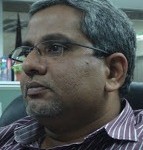–

Bijo Francis
Mr. N K Illangakoon
Inspector General of Police
New Secretariat
Colombo 1
SRI LANKA
Fax: +94 11 2 440440 / 327877
E-mail: [email protected]
Dear Mr. Illangakoon,
Re: Cases of torture perpetrated by officers of the Sri Lankan Police
I am writing to bring to your notice a letter the Asian Human Rights Commission wrote to His Excellency the President of Sri Lanka on the use of chilli by police officers for torturing suspects they are interrogating. I am also bringing to your notice three extremely brutal cases of torture reported from Sri Lanka recently: Madawala Maddumage Don Aruna Nilupul Indika, a reputed interior decorator was arrested on the basis of a false complaint and subjected to severe torture by way of the application of the juice of chillies which was forced into his eyes, penis and anus. The second case was that of Mr. Chandila Padmakumara Gurusinghe who was also tortured with chilli and threatened with sodomy. The third was that of Kopiya Waththage Don Chaminda Priyantha Kumara who was tortured by the use of a wooden mallet on his testicles.
In all these three cases there are the following features.
- There were no reasonable grounds for the arrest of these persons.
- At the moment of arrest they were not informed of the reason for their arrest, thus violating the Constitutional guarantee of the right to be informed of the reason for attest.
- There was no reasonable questioning at the time of arrest or after they were brought to the police station.
- The beginning of the interaction with the suspects was by torture. While the torture was ongoing they were asked about information on what the police suspected them of with the view to obtain information from the suspects themselves about what they might have done.
- The methods of torture were inhumane such as forcing the suspects to remove their clothes, the application of chilli and/or the beating of the testicles with blunt instruments and suspending them by the wrists from the ceiling and the use of extremely filthy language.
- At the end of the ordeals what the police found was that the persons were completely innocent of the crimes that the police suspected them of having committed.
- Despite of all this in two instances fabricated charges were filed.
I am attaching the letter written to His Excellency the President as well as the reports of complaints made by the persons who were subjected to these ordeals.
As you are well aware the practice of torture and the use of extremely brutal methods are a common factor in police interrogations in Sri Lanka. This is despite of the constitutional provisions guaranteeing citizens protection against torture and the provision of the law under the CAT Act, No. 22 of 1994 which criminalised torture and prescribes 7 years of rigorous imprisonment and a fine of Rs. 10.000/= against any offender.
One of the main reasons for the widespread use of torture is the stopping of investigations under the CAT Act and the prosecutions on the basis of that law. At present Act No. 22 of 1994 is a law that is deliberately not implemented in Sri Lanka.
You will also admit that without the acquiescence of high ranking police officers from the OIC’s up to ASPs, SSPs and DIGs this widespread practice cannot take place. Therefore it is a valid assumption that as a matter of policy torture is allowed and encouraged to be done by police officers despite of constitutional provisions and criminal law provision prohibiting torture. When the highest ranking police officers are complicit in the violation of the constitution and the criminal law what hope can there be for the protection of the citizens and the enforcement of the rule of law.
The common excuse seems to be that the policing establishment believes that it is not equipped with the necessary resources, including adequate financial resources, for the proper enforcement of their duties and therefore resorting to barbaric and illegal methods is justified as the overall aim is the prevention of crime. An important institution such as the police, if it assumes that it cannot abide by the law which it is supposed to enforce, is a manifestation of an extraordinary crisis in the country.
As the highest ranking police officer in Sri Lanka it is your duty, together with other high ranking officers, to bring to the notice of the executive and the legislature the inadequacies of resources and financial allocations you suffer from, if such is the case. However, this should not be used as an excuse to violate the constitution, the criminal law of the country and to expose the citizens to such extraordinary cruel and illegal behaviour on the part of the country’s law enforcement officers.
We earnestly urge you to take this matter seriously and:
- Take steps to ensure investigations under the CAT Act, No. 22 of 1994 into the complaints of torture and ill-treatment through a special unit of inquiry of the Criminal Investigation Division as this used to be done before it was deliberately discontinued.
- To discuss with the highest ranking officers of the police the nature of command responsibility they owe within the policing system and the consequences of the failure to carry out such responsibility.
- Issue written instructions to reinforce the constitutional criminal law provisions against torture.
- Take disciplinary action including the dismissal of officers who have practiced such brutal actions.
Thank you.
Yours sincerely,
Bijo Francis
Executive Director
Asian Human Rights Commission
Attached: Letter to His Excellency, President Mahinda Rajapaksa
SRI LANKA: A reputed Interior Decorator is severely tortured by officers of Matugama Police at the instigation of a lawyer and her husband
SRI LANKA: Officers of the Karandeniya police torture and threaten to sodomize businessman, insulting him about his ‘low’ caste origin
SRI LANKA: Officers of the Kalutara South Police Station beat a man’s testicles with a wooden mallet
